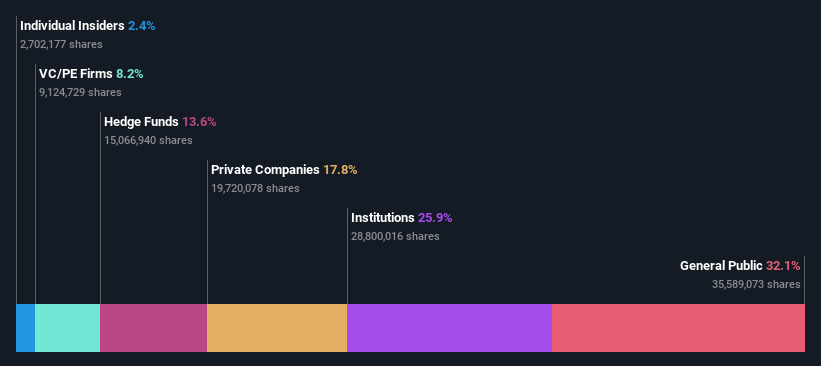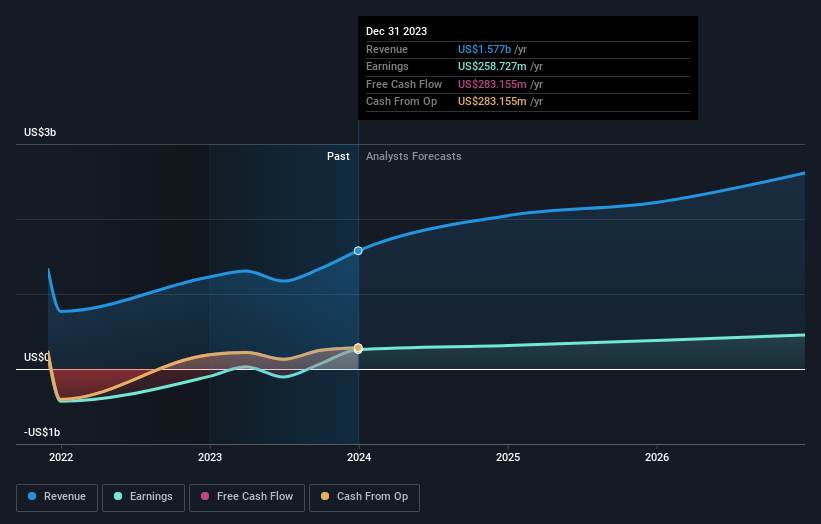Stock Analysis
- United States
- /
- Insurance
- /
- NYSE:HG
individual investors who own 32% along with institutions invested in Hamilton Insurance Group, Ltd. (NYSE:HG) saw increase in their holdings value last week

Key Insights
- Significant control over Hamilton Insurance Group by individual investors implies that the general public has more power to influence management and governance-related decisions
- 50% of the business is held by the top 7 shareholders
- 26% of Hamilton Insurance Group is held by Institutions
A look at the shareholders of Hamilton Insurance Group, Ltd. (NYSE:HG) can tell us which group is most powerful. With 32% stake, individual investors possess the maximum shares in the company. Put another way, the group faces the maximum upside potential (or downside risk).
While individual investors were the group that benefitted the most from last week’s US$162m market cap gain, institutions too had a 26% share in those profits.
In the chart below, we zoom in on the different ownership groups of Hamilton Insurance Group.
See our latest analysis for Hamilton Insurance Group

What Does The Institutional Ownership Tell Us About Hamilton Insurance Group?
Institutions typically measure themselves against a benchmark when reporting to their own investors, so they often become more enthusiastic about a stock once it's included in a major index. We would expect most companies to have some institutions on the register, especially if they are growing.
We can see that Hamilton Insurance Group does have institutional investors; and they hold a good portion of the company's stock. This can indicate that the company has a certain degree of credibility in the investment community. However, it is best to be wary of relying on the supposed validation that comes with institutional investors. They too, get it wrong sometimes. It is not uncommon to see a big share price drop if two large institutional investors try to sell out of a stock at the same time. So it is worth checking the past earnings trajectory of Hamilton Insurance Group, (below). Of course, keep in mind that there are other factors to consider, too.

It looks like hedge funds own 14% of Hamilton Insurance Group shares. That catches my attention because hedge funds sometimes try to influence management, or bring about changes that will create near term value for shareholders. Magnitude Capital, LLC is currently the largest shareholder, with 14% of shares outstanding. Hopkins Holdings, LLC is the second largest shareholder owning 9.1% of common stock, and Sango Hoken Holdings, LLC holds about 8.7% of the company stock. In addition, we found that Giuseppina Albo, the CEO has 0.6% of the shares allocated to their name.
We also observed that the top 7 shareholders account for more than half of the share register, with a few smaller shareholders to balance the interests of the larger ones to a certain extent.
Researching institutional ownership is a good way to gauge and filter a stock's expected performance. The same can be achieved by studying analyst sentiments. Quite a few analysts cover the stock, so you could look into forecast growth quite easily.
Insider Ownership Of Hamilton Insurance Group
While the precise definition of an insider can be subjective, almost everyone considers board members to be insiders. The company management answer to the board and the latter should represent the interests of shareholders. Notably, sometimes top-level managers are on the board themselves.
I generally consider insider ownership to be a good thing. However, on some occasions it makes it more difficult for other shareholders to hold the board accountable for decisions.
Shareholders would probably be interested to learn that insiders own shares in Hamilton Insurance Group, Ltd.. The insiders have a meaningful stake worth US$40m. Most would see this as a real positive. If you would like to explore the question of insider alignment, you can click here to see if insiders have been buying or selling.
General Public Ownership
The general public, who are usually individual investors, hold a 32% stake in Hamilton Insurance Group. While this size of ownership may not be enough to sway a policy decision in their favour, they can still make a collective impact on company policies.
Private Equity Ownership
With a stake of 8.2%, private equity firms could influence the Hamilton Insurance Group board. Some investors might be encouraged by this, since private equity are sometimes able to encourage strategies that help the market see the value in the company. Alternatively, those holders might be exiting the investment after taking it public.
Private Company Ownership
Our data indicates that Private Companies hold 18%, of the company's shares. It's hard to draw any conclusions from this fact alone, so its worth looking into who owns those private companies. Sometimes insiders or other related parties have an interest in shares in a public company through a separate private company.
Next Steps:
While it is well worth considering the different groups that own a company, there are other factors that are even more important.
I like to dive deeper into how a company has performed in the past. You can find historic revenue and earnings in this detailed graph.
If you would prefer discover what analysts are predicting in terms of future growth, do not miss this free report on analyst forecasts.
NB: Figures in this article are calculated using data from the last twelve months, which refer to the 12-month period ending on the last date of the month the financial statement is dated. This may not be consistent with full year annual report figures.
Valuation is complex, but we're helping make it simple.
Find out whether Hamilton Insurance Group is potentially over or undervalued by checking out our comprehensive analysis, which includes fair value estimates, risks and warnings, dividends, insider transactions and financial health.
View the Free AnalysisHave feedback on this article? Concerned about the content? Get in touch with us directly. Alternatively, email editorial-team (at) simplywallst.com.
This article by Simply Wall St is general in nature. We provide commentary based on historical data and analyst forecasts only using an unbiased methodology and our articles are not intended to be financial advice. It does not constitute a recommendation to buy or sell any stock, and does not take account of your objectives, or your financial situation. We aim to bring you long-term focused analysis driven by fundamental data. Note that our analysis may not factor in the latest price-sensitive company announcements or qualitative material. Simply Wall St has no position in any stocks mentioned.
About NYSE:HG
Hamilton Insurance Group
Through its subsidiaries, provides underwriting specialty insurance and reinsurance risks in Bermuda and internationally.
Outstanding track record and undervalued.


